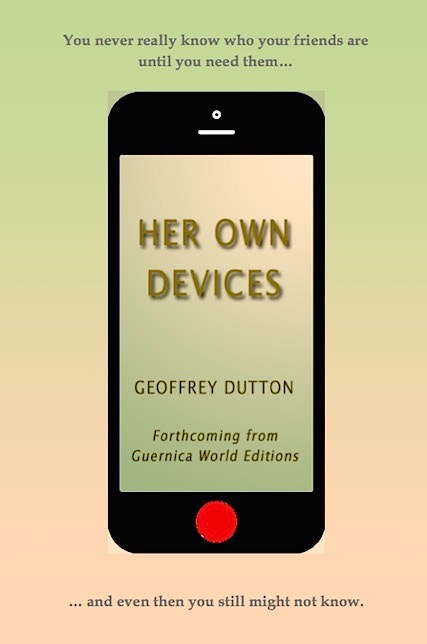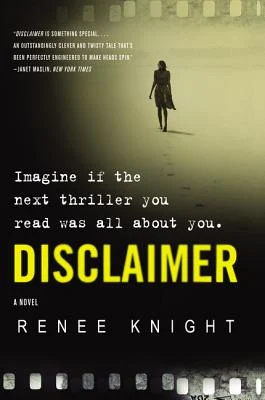1. As the Victim
Renée Knight’s clever and suspenseful psychological thriller wouldn’t have caught my eye but for a friend pointing out the “book-within-a-book” literary device it employs: someone slips main character Catherine Ravenscroft a novel written about her that lays bare a dark secret she thought nobody knew. That got my attention, as I’m now finishing a novel in which I thrust the same literary device upon my female protagonist, likewise to her dismay.
Book-within-a-book isn’t a modern invention, of course. In Shakespeare’s most famous play, seeking revenge, Hamlet schemes to cast guilt on Claudius by mounting a play-within-a-play recapitulating his uncle’s murder of his father, the King. Claudius storms out, implicating himself, and Hamlet vows to kill him. In Disclaimer, a literary device outs Catherine’s dark secret, produced by a man scheming to ruin her. Unlike Claudius, she survives, having learned “to thine own self be true” the hard way.
Over the first few chapters of Disclaimer, a pseudonymous avenger produces a work of thinly veiled fiction that implicates Catherine in his son’s death. Knight’s title refers to the boilerplate prefacing all novels about not representing any actual people, living or dead. In the copy of the book Catherine receives, the disclaimer had been inauspiciously struck out in red ink.
Catherine—like author Renée Knight once was—is a documentary film director, but all we get to see of her work are a few office scenes. She’s happily married to very busy but ever- attentive solicitor Robert Ravenscroft. As the book opens, they have just kicked their 25-year old son Nick out of the nest when they downsized to smaller digs in London. We will travel with them from 2013 London to 1993 Spain and back numerous times in chapters alternating between her POV and that of the mystery author.
He’s ageing, depressive Stephen Brigstocke, the sole surviving member of another family of three that also included a grown son. A few other characters pop up, but only these diametrically opposed six really matter. Retired teacher Stephen believes he channels his late wife Nancy as his muse, whispering him to avenge the death of their son Jonathan, whose last acts on earth connected the two families, and not in a good way.
Twenty years ago, young Jonathan Brigstocke drowned on a Spanish beach saving five-year-old Nick from being pulled out to sea the day after he and Catherine had sex. He’d shown up at the seaside hotel where Catherine’s family was staying. Robert had been called back to London on business the day before, leaving Catherine to tend to Nick for a few days. She thought she had put the terrible events in Spain behind her until Stephen blew the whistle on her two decades later.
Based on what Spanish police had told her and photos she retrieved from Jonathan’s camera, Nancy, an unpublished novelist, chronicled his last days and noble demise. Some of those photos showed an attractive woman on a hotel room bed in lewd and suggestive poses who had to be Catherine Ravenscroft. When, after Nancy succumbed to cancer, a bitter and lonely Stephen came upon Jonathan’s photos and Nancy’s narrative, it became his mission to exact revenge on the temptress who, in caring more for her pleasure than for her own child, precipitated Jonathan’s death.
Compelled by bitterness and by Nancy’s spiteful spirit, he researches Catherine and self-publishes Nancy’s vicarious memoir under the title A Perfect Stranger. He then assails Catherine’s comfortable life by scratching out the disclaimer and posting it to her and later to Robert and Nick, hoping to alienate them from her. And so it goes; chapter by chapter, corrosive poison seeps forth in slow motion.
Chapters of Disclaimer alternate between Catherine’s point of view (in third person) and Stephen’s (in first person). Other than a brief excerpt of A Perfect Stranger, Stephen’s chapters are in his voice. Despite being slow-going and overwrought at times, the dueling perspectives work well, and Knight is skillful enough to keep readers (this one, at least) from speculating about what really happened at that Spanish resort until revealing a more shocking truth that I dare not spoil, save to say it made me wonder what all the fuss was about.
Knight’s writing is snappy, with short, sometimes choppy sentences and generally apt conceits, though some veer into purplish territory. She handles voice well: Stephen sounds like a man as much as Catherine’s introspection feels feminine. Robert, who has a lot of lines, is less convincing; Knight casts him as the epitome of a loving husband until suddenly he’s not. His abject turnaround seems overblown, as do many emotive passages in Disclaimer. And despite relentlessly plumbing her characters’ psyches, Knight doesn’t illuminate why they (Catherine and Robert and Nick in particular) behave as self-destructively as they do.
2. As the Avenger

Despite its characters’ flaws, Disclaimer‘s ingenious plot kept me turning pages to its anticlimactic denouement. All the while, I was comparing it to my work in progress of women’s crime fiction, Her Own Devices—set in Athens with a Swiss protagonist. It too centers on a woman with a hidden past who faces unexpected challenges and even has a ghostly presence (a dead lover who, unlike the late Nancy, addresses the reader directly). Its story line follows her, him, and several other characters from my 2018 thriller Turkey Shoot, recapitulating events she rues and would prefer to forget.
Her name is Anna, and in the Foreword written in her own voice she reports having read my novel, which details her radical past—including being an accessory to a double murder and an assassination plot. Like Catherine, Anna is dismayed to find her secrets pulsing in print and makes her discomfort known. Feeling she deserves an explanation, she contacts the book’s publisher and trades emails with Max, Turkey Shoot‘s fictional editor. Max contends that to know all those intimate details, the author had to have mysteriously channeled Anna. He then alleges that the same author is set to write her up again, but this time requests her cooperation. Feeling she’s got no say in the matter, Anna reluctantly acquiesces to be covertly surveiled. (She, in turn, will stalk and surveil some crooks.) She’s not happy when Max tells her to expect challenges that she can overcome if she cultivates allies, and that is what she does.
Once the story begins, Anna puts the clairvoyant writer out of her mind when things start happening. She witnesses a kidnapping, documents it, testifies in court, and indignantly pursues the culprit after he’s let go, collecting allies along the way. Max too is absent for the body of the book but returns in the Afterword to absorb Anna’s equivocal reactions to what befell her.
Besides her stealthy Boswell of an author, she’s also surveilled by Mahmoud, Anna’s lover and father of their five-year-old son, who died in Turkey Shoot. But instead of Paradise, his poor soul found itself stuck in a featureless limbo, from where he learns to project his vision to watch over the family he left behind. His voyeuristic spirit follows Anna & son trying to sense their situation, wishing he could help, expressing what he gleans in soliloquies only the reader can hear. Though lacking agency in the pre-afterlife (as he calls our plane), by the end his earnest desire to comfort Anna and child just may have paid off.
3. As It Happens
Two books with two literary devices in common, both urban tales of vigilante justice linking past with present, yet so unalike, with different characters in different countries with different spiritual advisors grappling with different crimes. Yet none of that matters so long as their authors can make it feel real for readers. You decide which work most draws you in.






